Comprehensive Guide to Starting a Transport Company in Austria
 Austria, located in the heart of Europe, is a prime hub for transport and logistics businesses. Its central location, excellent infrastructure, and role as a transit point for goods moving between Western and Eastern Europe make it a highly attractive market for transport companies. However, starting a transport company in Austria requires adherence to specific legal, regulatory, and operational requirements. This guide provides a detailed roadmap to help you navigate the process of establishing a transport business in Austria.
Austria, located in the heart of Europe, is a prime hub for transport and logistics businesses. Its central location, excellent infrastructure, and role as a transit point for goods moving between Western and Eastern Europe make it a highly attractive market for transport companies. However, starting a transport company in Austria requires adherence to specific legal, regulatory, and operational requirements. This guide provides a detailed roadmap to help you navigate the process of establishing a transport business in Austria.
Choosing a Legal Business Structure
Selecting the right legal structure is essential for determining liability, taxation, and operational requirements. Common options include:
- Einzelunternehmen (Sole Proprietorship):
- Simple to set up, but the owner assumes unlimited personal liability. Einzelunternehmen
- Gesellschaft mit beschränkter Haftung (GmbH):
- A limited liability company suitable for medium to large businesses, requiring a minimum capital of €35,000. Gesellschaft mit beschränkter Haftung
- Offene Gesellschaft (OG) or Kommanditgesellschaft (KG):
- Partnership structures with shared responsibilities among partners. Welche Gesellschaftsformen gibt es in Österreich?
Business Registration
- Register with the Austrian Business Register (Firmenbuch):
-
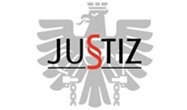 Submit the company’s name, structure, and details. GmbHs and larger entities require notarized documentation for registration. Online Anmeldung beim Firmenbuch
Submit the company’s name, structure, and details. GmbHs and larger entities require notarized documentation for registration. Online Anmeldung beim Firmenbuch
- Obtain a Tax Number:
-
 Register with the Austrian Tax Authority (Finanzamt) to receive a tax identification number. Finanzamt Österreich
Register with the Austrian Tax Authority (Finanzamt) to receive a tax identification number. Finanzamt Österreich
- Register with the Austrian Social Insurance Authority (SVS):
-
 This applies if you hire employees or operate as a self-employed business owner. Sozialversicherung der Selbständigen (SVS)
This applies if you hire employees or operate as a self-employed business owner. Sozialversicherung der Selbständigen (SVS)
Licensing and Permits: Road Transport Permit
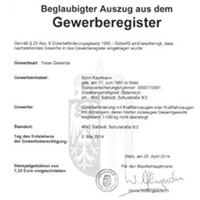 To operate a transport business in Austria, you must obtain a Gewerbeberechtigung (Trade License) from the local district authority. For transport-specific operations, you’ll need additional permits:
To operate a transport business in Austria, you must obtain a Gewerbeberechtigung (Trade License) from the local district authority. For transport-specific operations, you’ll need additional permits:
- National Transport License:
- For operating within Austria.
- EU Transport License:
- Required for cross-border goods transport within the EU. Grenzüberschreitender Straßengüterverkehr. Genehmigung
Licensing Requirements
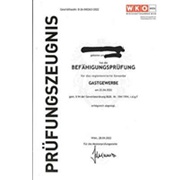
- Proof of Professional Competence:
- The transport manager must hold a Certificate of Professional Competence (CPC). Befähigungsprüfung Güterbeförderung
- Financial Standing:
- Evidence of adequate financial resources is required: €9,000 for the first vehicle and €5,000 for each additional vehicle.
- Good Repute:
- Key personnel must have a clean criminal record and no previous financial misconduct.
Specialized Permits
- ADR Certification:
- Mandatory for transporting dangerous goods under the European Agreement concerning the International Carriage of Dangerous Goods by Road.
- Oversized Vehicle Permits:
- Required for heavy or oversized loads.
Vehicle Registration and Compliance
- Vehicle Registration
-
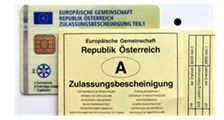 All vehicles used for transport must be registered with the Austrian Transport Authority (Kraftfahrzeug-Zulassungsbehörde). Requirements include: Proof of ownership. Insurance documentation. Vehicle inspection certificate. Kfz-Zulassung in Österreich
All vehicles used for transport must be registered with the Austrian Transport Authority (Kraftfahrzeug-Zulassungsbehörde). Requirements include: Proof of ownership. Insurance documentation. Vehicle inspection certificate. Kfz-Zulassung in Österreich
- Technical Inspections
-
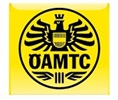 Regular inspections are mandatory to ensure roadworthiness. Heavy vehicles are subject to stricter requirements, including annual checks. Begutachtung (Pickerl)
Regular inspections are mandatory to ensure roadworthiness. Heavy vehicles are subject to stricter requirements, including annual checks. Begutachtung (Pickerl)
- Emissions Standards
- Vehicles must comply with EU emissions standards, including Euro 6 norms. Some Austrian cities enforce low-emission zones that restrict older, polluting vehicles.
Insurance Requirements
- Mandatory Insurance
- Liability Insurance: Covers damages caused to third parties. Vehicle Insurance: Protects vehicles against accidents and damages. Cargo Insurance: Covers goods in transit.
- Optional Insurance
- Business Liability Insurance: Protects against operational risks. Employer Liability Insurance: Required if you hire employees.
Employment and Labor Regulations
- Hiring Drivers
-
 Drivers must hold a valid Category C or CE driver’s license for heavy vehicles. Completion of Driver Certificate of Professional Competence (CPC) training is mandatory and must be renewed every five years. C95 Weiterbildung für LKW-Fahrer
Drivers must hold a valid Category C or CE driver’s license for heavy vehicles. Completion of Driver Certificate of Professional Competence (CPC) training is mandatory and must be renewed every five years. C95 Weiterbildung für LKW-Fahrer
- Labor Compliance
-
 Register employees with the Austrian Social Insurance Authority (SVS) for pensions, health insurance, and other benefits. Comply with Austrian labor laws governing minimum wages, working hours, and conditions. Portal der österreichischen Sozialversicherung
Register employees with the Austrian Social Insurance Authority (SVS) for pensions, health insurance, and other benefits. Comply with Austrian labor laws governing minimum wages, working hours, and conditions. Portal der österreichischen Sozialversicherung
- Driving Hours and Rest Periods
- Adhere to EU Regulation (EC) No 561/2006, which regulates driving hours and mandatory rest periods. Equip vehicles with tachographs to monitor compliance. Driving time and rest periods in the road transport sector
Taxation and Financial Obligations
- Corporate Taxation
- Austria has a corporate income tax rate of 25% on company profits. VAT (Value Added Tax) applies at a standard rate of 20%, with reduced rates for specific goods and services.
- Road Taxes and Tolls
-
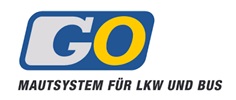 Heavy Goods Vehicles (HGVs) are subject to the GO-Maut toll system, calculated based on distance traveled, vehicle class, and emissions. Tolls apply to highways and specific routes. GO-Maut & SelfCare-Portalr
Heavy Goods Vehicles (HGVs) are subject to the GO-Maut toll system, calculated based on distance traveled, vehicle class, and emissions. Tolls apply to highways and specific routes. GO-Maut & SelfCare-Portalr
Environmental Obligations
- Low-Emission Zones (LEZs)
- Cities like Vienna enforce low-emission zones, restricting access for high-pollution vehicles. Vehicles must comply with emission standards or obtain special permits. Umweltzonen Österreich
- Green Incentives
- The Austrian government offers incentives for adopting eco-friendly vehicles, including electric or hybrid trucks. Subsidies and tax benefits are available for companies implementing sustainable practices.
Operational Standards and Safety
- Cargo Safety
- Adhere to EU regulations for securing cargo to prevent accidents and damage during transit. Ensure vehicles are equipped with safety equipment like reflective signs and fire extinguishers.
- Health and Safety Compliance
- Conduct regular safety training for employees, particularly in handling heavy or hazardous materials. Implement protocols for safe loading and unloading.
- Documentation
- Maintain detailed records of vehicle maintenance, driver hours, and financial transactions to ensure compliance with regulatory inspections.
Digitalization and Innovation
- Fleet Management Tools
- Use GPS and fleet management software to optimize routes, monitor vehicle performance, and reduce fuel consumption.
- Sustainable Practices
- Incorporate alternative fuels, such as biofuels or LNG, to reduce carbon emissions. Use digital platforms to enhance supply chain efficiency and reduce costs.
Inspections and Penalties
- Regulatory Inspections
- Austrian authorities conduct regular checks to ensure compliance with transport and safety regulations. Non-compliance can lead to fines, suspension of licenses, or operational shutdowns.
- Penalties for Non-Compliance
- Hefty fines apply for violations, including improper documentation, unsafe vehicles, or breaches of driving hours regulations.
Conclusion
Starting a transport company in Austria offers excellent opportunities due to the country's strategic location and robust infrastructure. However, the process involves navigating complex legal and regulatory requirements, from business registration and licensing to vehicle compliance and environmental standards. By meeting these obligations, leveraging innovative practices, and embracing sustainable technologies, you can position your transport business for long-term success in the Austrian market.
eXus Dev